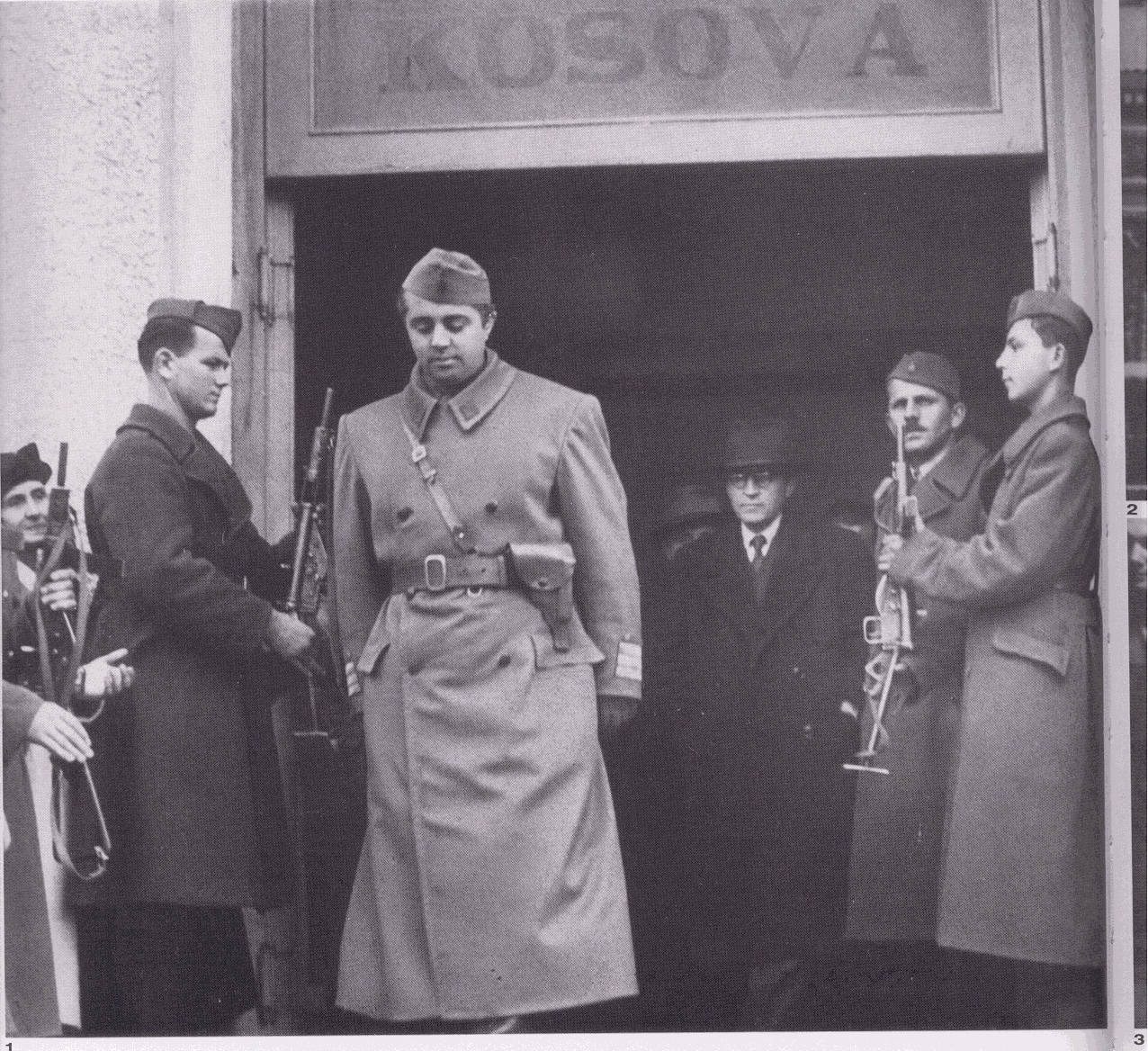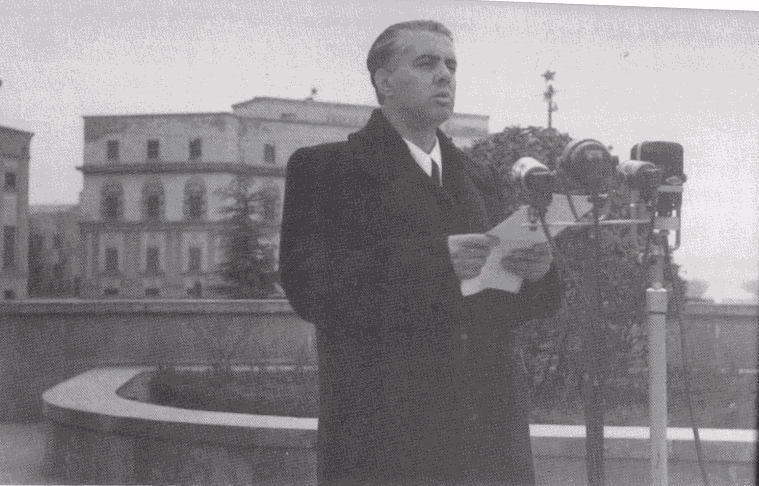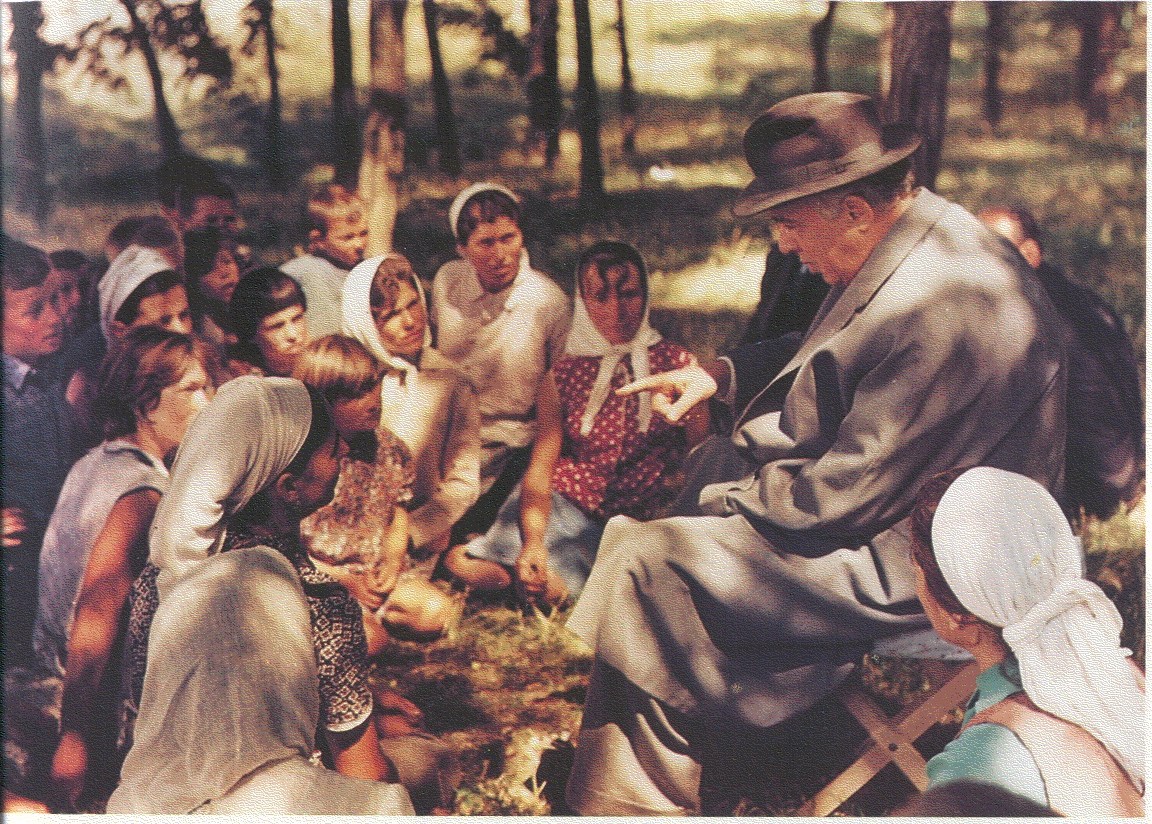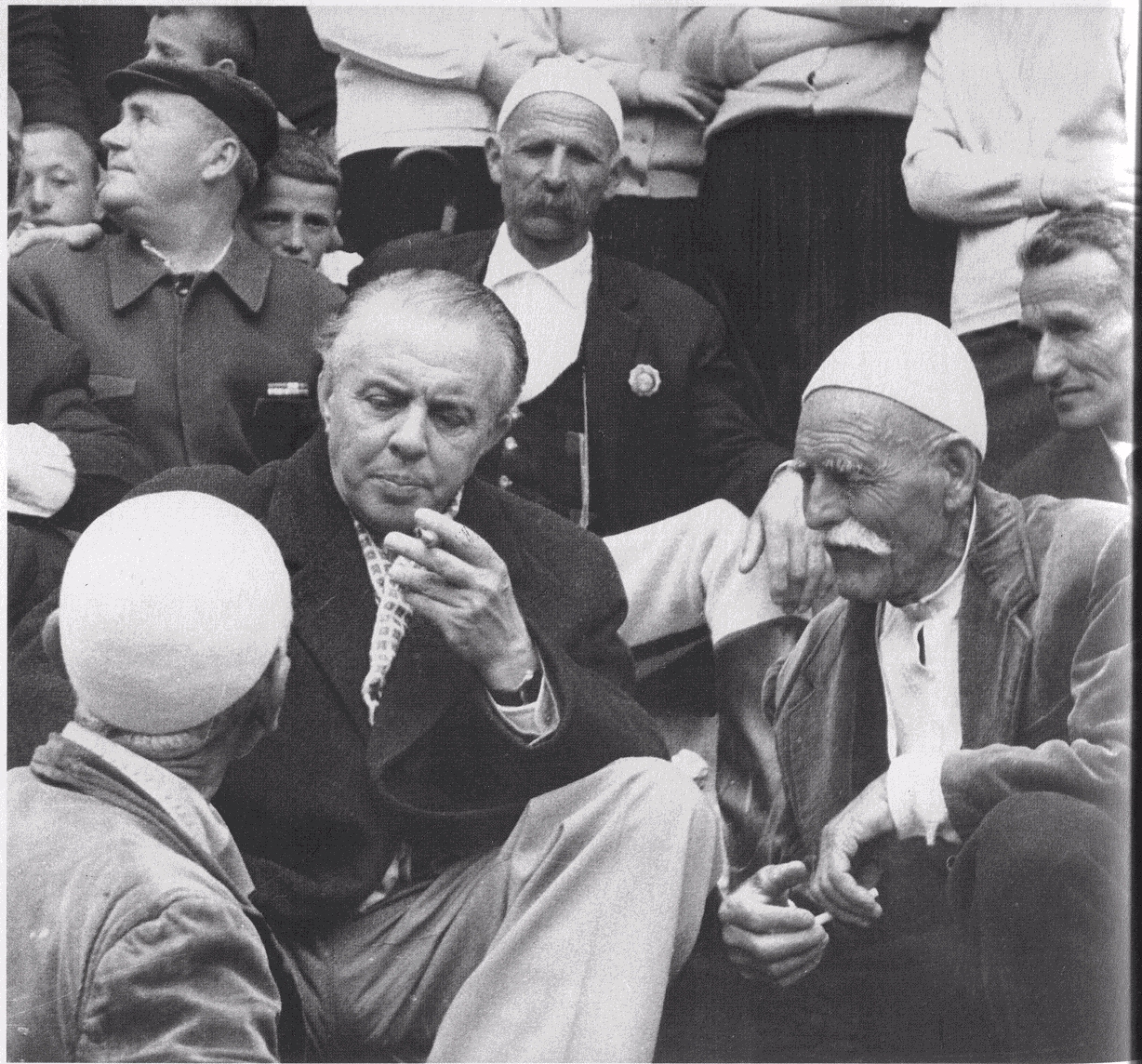




I feel that the title of my address – "Enver Hoxha as World Statesmen" – must have caused some raised eyebrows. Whether they like their policies or not, most people would accept Ronald Regan and Mikhail Gorbachov as world statesmen. But Enver Hoxha was the leader of a small country, the size of Wales with a population of less than three millions. Can the leader of a small country ever really be a statesman, or stateswoman, of world stature?
But it is only a few years ago that tens of thousands of people were marching through the streets of cities all over the world shouting with approval the name of Ho Chi Minh. Ho’s politics were not the same as those of Enver Hoxha, but he was the leader of a small country which inflicted on the powerful United States of America the first military defeat in its history.
Albania too has successfully resisted attempts at absorption, invasion, dismemberment and destabilisation from Greece, from Yugoslavia, from the Soviet Union after the death of Stalin, from China, from Britain and from the United States. It has constructed a planned socialist economy which is, at present, unique in the world.
How has it come about that Albania has followed, in the last forty years, such a different course of development from that of other countries of south-eastern Europe?
The cause cannot be found in any geographical or historical peculiarities of Albania. It lies in the specific character of the leadership of the political party which has been the leading force in Albanian society during these forty years. And pre-eminent in that leadership over these four decades was Enver Hoxha, who died in April at the age of 76.
Some people have expressed surprised that Hoxha’s death should have been reported with such virulent hostility by almost all our press, radio and television. But they should not be surprised.
The successful construction of a planned socialist society in Albania – a society without profit, without millionaires, without unemployment, without inflation, without taxes and with constantly rising living standards – is a threat to everything which "The Sunday Times" and the BBC hold up as "Western civilisation".
Enver Hoxha would not have been surprised at his obituaries in the British media. When the British press praises someone who call himself a "socialist", it is time to question the genuineness of his "socialism". And, of course, this hostile propaganda does not have entirely the results it aims at. In the week in which these obituaries were published, the Albanian society received more applications for membership than in any month in the past twenty-five years. One miner from South Wales wrote to me:
But it defines the Albanian state as "the dictatorship of the working class", not that of an individual. This simply means that the political power in Albania is in the hands of the working class, that the working class rules. Albanians do not present "the dictatorship of the working class" as the opposite of democracy. On the contrary, using the term "democracy" with its classical Greek meaning of "the rule of the common people", they maintain that working class power is the only genuine democracy.
The Party of Labour of Albania regards Britain as a dictatorship – as a state in which political power is in reality in the hands of Big Business. But they do not imply by that term that Margaret Thatcher is a personal dictator. Nevertheless, the leader of the ruling party in Britain has somewhat more constitutional power than the leader of the ruling party in Albania: he or she is automatically Prime Minister and has the right to appoint and dismiss Ministers.
The leadership of the Party of Labour of Albania, which forms the core of the Albanian society, has always been a collective one, although Enver Hoxha was pre-eminent in that leadership. But this position of pre-eminence was the result of Hoxha’s outstanding abilities and devoted service to the working people, and the respect and love which flowed from these qualities.
Let us look more closely at the causes of Albania’s unique course of social development.
Today, the social system in Greece is very different from that in neighboring Albania. Yet in 1944 the situation in the two countries was closely similar. Both were under German occupation; both had national liberation movements led by their respective communist parties; both had right-wing spurious "nationalist" movements, supported by British gold and weapons, which fought the national liberation movements in collaboration with the Nazi forces; in both countries British troops landed, ostensibly to "help" in liberation.
It was the different reaction of the two communist parties which gave rise to the different outcome in the two countries.
The leaders of the so-called "Communist Party of Greece" signed a truce with the right-wing collaborators, placed their forces under the command of the right-wing government-in-exile and of the British Commander-in-Chief, welcomed the British troops.
The leaders of the Communist Party of Albania – today the Party of Labour – destroyed the collaborationist forces; they thanked the British troops for their "offer of help’ but insisted that they withdraw from Albanian soil. They did so.
Let us look at another facet of Albania’s unique course of development.
In 1945 the countries of Eastern Europe (except for Greece) were following the model of the Soviet Union under Lenin and Stalin in constructing planned socialist societies based on the principles of Marxism-Leninism.
Today only Albania continues to adhere to those principles.
Admittedly, this is not the impression one gets from the pages of "Pravda". But like our "popular" press, this is now a newspaper which aims not at the truth, but at misleading the masses.
If one studies the specialised Soviet economic journals a very different picture emerges. The so-called "economic reforms" instituted after the death of Stalin have abandoned central economic planning; the profitability of each enterprise has become once more the motive and regulator of production.
True, these profits – as in orthodox "profit-sharing" schemes in the "West" – are shared among the whole staff of the enterprise. But they are distributed according to what is termed "responsibility in profit-making", which means that the lion’s share goes to management. The latest statistics show that 51% of the profits go to workers (who form 96% of the personnel), while 49% go to management (who form 4% of the personnel).
The restoration of the profit motive in the Soviet Union has meant reliance on market forces, on the laws of "supply and demand". This means, as elsewhere, that it is often more profitable to produce luxury items for the wealthy than necessities of life for the working people.
Enver Hoxha described contemporary Soviet society as essentially a capitalist society, in which the working people were exploited by a new ruling class, a new capitalist class – the enterprise directors. He noted that all the negative phenomena which are associated with capitalism have began to reappear – crises of "over-production", inflation, redundancy, etc.
True, the Soviet economic journals do not speak of "unemployment", only of "surplus labour". To solve this problem a "youth employment scheme" has been established, and an official campaign that "a woman’s place is in the home"! Letters are published calling – not, of course, for "unemployment benefit", but for "stipends" for workers who are "between jobs".
Such development has proceeded – sometimes faster, sometimes slower – in all the formerly socialist countries of eastern Europe, except for Albania.
Whereas the Albanian constitution prohibits foreign aid and credits, the other countries are obliged not only to the Soviet Union, but to Western financial institutions. The hard currency indebtedness of Bulgaria stands at $9 billion, of Hungary at $10 billion, of Yugoslavia at $19 billion and of Poland at $26 billion (on which it cannot pay even the interest due).
Official figures show that in Poland the real wages of the workers fell between 1981 and 1984 by more than 30%.
Inflation in Poland is running at 38% a year, in Yugoslavia at 57%.
Unemployment in Yugoslavia stands at 13% of the work force (30% in the Albanian province of Kosova).
There were, of course, prominent Albanians who sought to lead Albania along this same road of, in Hoxha’s words, "capitalist degeneration".
It was, above all, Hoxha who led the ideological struggle against the views of these individuals. These struggles are usually portrayed in our press as "personal power struggles". There were nothing of the sort. There were in each case struggles around principle – with Hoxha standing successfully for the maintenance of independence and socialism for his country.
Whether one is a socialist or not, the question of socialism – how to attain it and how to maintain it – is a question of international importance.
Marxism-Leninism has always held that the state in capitalist countries is always – no matter what its parliamentary trappings – in reality the dictatorship of Big Business. It has always held, therefore, that this state apparatus of force will be used against any attempt to establish a socialist society, so that the working people must be prepared for revolutionary struggle. It has always held that the belief that a fundamental change in society can be attained through the ballot box alone is a dangerous illusion. This does not necessarily mean a bloody and protracted civil war – the number of people who died in the October Revolution in Russia was far less than the number killed on the roads of Manchester on a typical summer Sunday. Hoxha’s famous dictum was:
The leading role in the struggle against this "modern revisionism" was undoubtedly played by Enver Hoxha, who adhered all his adult life firmly to Marxist-Leninist principles. And, as I said, whether one is a socialist or not, these are questions of world importance. Hoxha’s leading role in these questions makes him, in this respect too, a world figure.
Furthermore, he was the author of a whole series of books, not only upon Albania, but on Yugoslavia, on the Soviet Union, on China, on the Middle East, and so on, which are essential reading for any serious student of world affairs.
But it is as the principal architect of Socialist Albania that Enver Hoxha’s qualities of leadership shine most clearly and obviously.
In forty years Albania has been transformed from the most backward country in Europe to an advanced industrialised state.
Where else in the world can one find no unemployment, with the right to work enshrined in the Constitution?
Where else can one find dwelling rents at 3% of income?
Where else can one find no rates, taxes or social service contributions combined with a free health service?
Where else can one find non-contributory pensions at 70% of pay, payable as young as 55 in certain occupations?
A visitor goes from Britain – with its barren industrial waste lands, with its four million unemployed, with its declining social services – to Albania to find a country which is one huge construction site, to a country whose people have well-founded confidence that each year their living standards will improve as production rises.
Some visiting newspaper reporters claim to find Albania "dull’.
They find no Soho "strip-tease" shows, no Mayfair gambling casinos, no pornographic magazines, no heroin pushers, no "pop" music. Enver Hoxha once said:
Where but in Albania one could go to the cinema for the equivalent of 15 pence?
What other country in the world with a population of less than three millions has 7 symphony orchestras and produces some 15 feature films a year?
Perhaps those who find Albania "dull" have had their cultural values corrupted!
One has only to look at pictures of Albania prior to 1939 – pictures which show its utter backwardness, its poor and illiterate working people, to understand the respect and affection which the overwhelming majority of the Albanian people held for the principal architect of their social progress – Enver Hoxha, to understand the genuine and spontaneous grief which was exhibited at his funeral.
Several monuments to Enver Hoxha are to be erected in Albania.
But the ordinary Albanian may well say – in the words of the inscription to our own Christopher Wren in St. Paul’s Cathedral –
Note From Alliance - Regretabbly the text of this poem,
or its name or identity of its author, is not known to us.
____________________________End___Article
___One____________________________


Enver Hoxha at Memorial meeting of J.V.Stalin at Skanderberg Square
5 March 1953; p.118


Left: Meeting cooperative workers at Plases 1972; p.186
Right: Meeting peasants at Qershor 1970; p.176
The Question of Dictatorship
In the Marxist-Leninist sense, this statement is undoubtedly true.
The second article of the 1976 Constitution states proudly:
The question of 'human rights' has long been used in Britain as a football. The United States, for example, may support in Latin America the most barbarous puppet dictatorships, whose 'death squads' carry out the organised murder of thousands of dissidents, without a murmur of protest from the British government or press. For them the sole criterion of whether 'human rights' exist in a country or not is whether or not the right of 'free enterprise' exists -that is, the right of capitalists, native and foreign, to make profits out of the labour of the working people.
In Socialist Albania, the Constitution laid down that
Restriction of Political Activity
This, again, is correct. Article 55 of the Socialist Constitution states:
Only a socialist social system, in which production is planned for the maximum welfare of the working people, can make the right to work effective.
It follows that to prohibit anti-socialist political activity and propaganda was not in violation of human rights, but served to defend a vital human right -- the 'right to work'.
The facts give an entirely different picture.
Official -statistics (the objectivity of which has been attested to by eminent British economists) show that between 1951 and 1985
On the contrary, Socialist Albania was extremely egalitarian. There was no unearned income and income was strictly proportional to the quantity and quality of work performed:
That Albania was relatively poor was not because of 'economic stagnation' under socialism, but mainly because of the appalling economic backwardness which it inherited from the past.
In spite of the absence of luxury goods, foreign visitors commented that people appeared well-fed, well-clothed and well-shod, and one saw no signs of such phenomena as malnutrition and homelessness which are to be found in much more economically developed countries.
Indeed, Socialist Albania had some of the finest social services in the world. For example, retirement pensions were 70% of an individual's pay at the time of retirement. The state built some 15,000 new dwellings a year and 80% of the population lived in dwellings built since the Second World War, paying a monthly rent equal to about three days' pay.
This progress in living standards was reflected in the statistics of expectation of life, which rose from 38.43 years in 1938 to 71.6 years in 1986-87. ('Statistical Yearbook of the PSR of Albania: 1988'; op. cit.; p. 29).
It is true that for the last few years of his life Enver Hoxha was gravely ill and some of the concealed anti-socialists in high positions took advantage of this -- as visiting experts have testified -- to adopt unscientific methods (particularly in agriculture) which caused some damage to the economy.
The picture of Albania at the present time is complicated by the fact that the regime at present in power strives to misrepresent the undoubted achievements of the Socialist society. Readers who have seen newsreels made recently in Albania -- showing for example, neglected children in an unheated orphanage in Shkodra -- should be aware that the authors of this pamphlet visited the same building some years ago and found the children clean and well-fed, with many toys. What kind of regime is that deliberately makes helpless children suffer in order to fake a propaganda film designed to elicit sympathy and aid!
Let us look at their situation now that they are 'free'.
The ' slow, steady improvement in living standards
under the Socialist regime has given way to economic catastrophe. In July
1992:
"Prices have risen by up to 400% since they were freed on a wide range
of products at the beginning of November (1991 -- Ed.), but wages have
remained fixed".
(Economist Intelligence Unit: 'Country Report: . . . Albania', No.
3,1992; p. 40).
"Output in in 1991 fell to 50% of the 1990 figure. . . .
Only half of the 300 largest industrial enterprises were operating.
. . .
During the past two years oil and gas production has declined by more
than 45%, chrome by about 60%, copper by about 70%, coal by about 50% and
light industry by about 60V. (Economist Intelligence Unit: 'Country Report:
. . . Albania', No. 2,
1992; p. 44).
"In August . . . the government sanctioned further massive increases
for a wide range of goods and services. Urban transport fares were raised
fivefold; long-distance bus fares 5.5- fold, train fares were trebled.
Rents were doubled; charges for domestic gas and central heating were trebled,
and the prices of medicines were increased on average by 2.5 times". (Economist
Intelligence Unit: 'Country Report:. . . Albania', No. 3,
1992; p. 41).
"Wages have not kept up with the explosion 'in prices".
(Economist Intelligence Unit: 93; : . . . Albania', 1992; p. 40).
"The volume of savings bank deposits rose 155 times between 1950 and
1978 . . . . Until recently Albania claimed to have the world's highest
savings ratio. Hyperinflation since 1991 has wiped out most of these savings".
(Economist Intelligence Unit: 'Country Profile: . . . Albania', 1992-93;
p. 40).
But small-scale peasant farming prevents the use of many types of agricultural machinery, and the dividing up of the successful large cooperative farms into smallholdings is an economic step backward. Furthermore, the increasing dependence upon foreign capital will not help forward Albania's industrial development, but lead towards a a colonial status concentrating on the production of raw materials and export crops.
In the name of 'freedom', the new regime has reversed this policy:
But in July 1992 Parliament passed a law banning any political party of a 'Marxist-Leninist, Stalinist or Enverist' character. Thereupon,
The neo-Nazis who run the new regime have, of course, no interest in maintaining Albania's independence and are quite willing to sell the country to the highest bidder and to convert the proud Albanian people into semicolonial slaves of one or other foreign power.
"The December bread riots are symptomatic of a more generalised breakdown
in law and order. Armed robbery, racketeering, murder, looting, burglary
and drugs related crimes have become commonplace. No one is safe".
(Economist Intelligence Unit: 'Country Report:. . . Albania', No. 1,
1992; p. 38-39).
But in 1991, it was announced
It then emerged that the state funds alleged to have been 'misappropriated' totalled only 885,930 leks (equivalent to E5,900) over 5 years -- i.e., E1,180 a year and related to expenditure approved by the Party of Labour for official duties as head of the Democratic Front until December 1990 and as Enver Hoxha's widow -- expenditure which could not possibly have been met from her small official salary of the equivalent of less than E150 a year. No claim was ever made at the trial that she had benefitted personally from these expenditures.
The 'Observer' commented:
"Prosecution witnesses all spoke in Mrs. Hoxha's defence, describing
her as 'honest' and 'modest"'.
('Guardian', 22 January 1993; p. 10).
This political persecution is carried out in contemporary Albania against thousands of those who contributed to the establishment of a free, independent and socialist Albania.
In the years that followed Liberation, he led the resistance to -successive pressure from Yugoslavia, the post-Stalin Soviet Union and China to preserve for the Albanian people the right to determine their own destiny.
In the 15th century, the national struggle of the Albanian people against foreign occupation was led by Skanderbeg. Bishop Fan Noli tells us that, when the Turks finally occupied Lezha, they desecrated Skanderbeg's grave. (Stilian Fan Noli: 'George Castriot Scanderbeg (1403-1468)'; New York; 1947; p.-70).
After the neo-Nazi traitors of the new 'democratic' government of Albania had finally taken power in Tirana, in May 1992